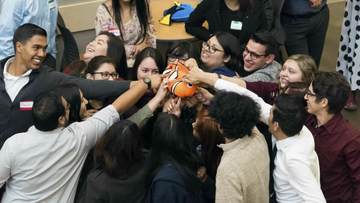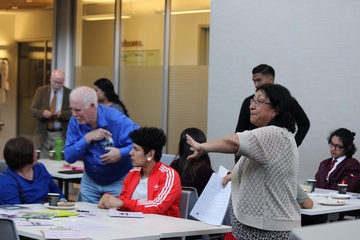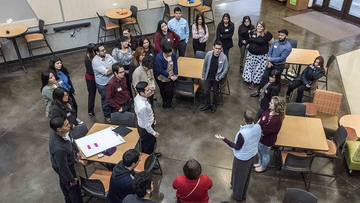Leadership & LLI |
November 30, 2020 |

Understanding that the big Latino community is left underrepresented and underserved for an unknown amount of time, CEO of LETI Rosario Reyes with the help of the president of Edmonds Community College Jean Hernandez decided to build leaders locally.
It started with a dialog
“If you had one thing to do” asked Hernandez “what would it be?”
“I would build a leader incubator” answered Reyes, who has already had experience teaching leadership in annual summer camps for the younger audience.
The action followed without delay. They organized a community meeting which gathered 40 people. Debates and considerations took a whole year.
Dr. Hernandez approached local educational institutions, and Edmonds, Everett, Skagit valley, and Whatcom community colleges became a part of the first Latino Leadership Initiative project.
The first graduation happened in 2013, and it was immediately obvious that the program makes a big impact.

Students would attend seminars where the most prominent Latinos of the area would tell their story. They would go through all their steps to success from the very beginning to show the young people that they were once just like them, trying to settle in a new country was not easy in those days and it is never easy. All the speakers are volunteers and good friends of LETI.
Antonio Sanchez, historian, PHD at University of Washington every year is talking about the history and achievements of Latin people in Washington state, and his lecture is usually a discovery for many students, because not many of them know how long is the story of Latinos in the USA.
Communication was the most important part of the theoretical part of workshops. It included networking and self-presentation practices. It is safe to say that one of those workshops changed the life of a student, who reached one of legislators asking for help with a university paperwork. The issue was that he was undocumented, but had perfect grades. In the end he made it into the University with a full four-year scholarship, and now is a successful engineer.
The big part of the training is the hands-on activities such as: guiding, mentoring, motivating or tutoring middle and high school students, often challenging, but always interesting tasks. Students only require 40 hours of community work. But there were cases when one group did 1000 hours and another 2000. Every year the community project is different, and who to work with is chosen by the members of the group. It could be middle or high school children, female middle schoolers at risk of dropping out, or undocumented students.

Final work is evaluated by the mentors, who give detailed feedback. This part of the project makes a big difference in the participant’s vision of life, often not having been involved in the community life, they begin to understand its needs and realize that it requires work and support of many people.
Rosario Reyes believes that “If a person starts helping others in their 20s, it is more likely that they will continue to do so after becoming famous and rich.”
Within the time LLI stayed mainly unchanged at its core. Of course, there were different speakers, different numbers of participants, but the topics and focuses are the same.
To organize a 6 months long retreat with weekly seminars is a challenging job. The project is funded by LETI and participating colleges donate $1,500 each for student’s reward, but all the speakers are volunteers. Successful professionals are often busy and have to go long distances to give a speech for free, and sometimes it does not sound appealing. But luckily so far there was no lack of speakers. However, there is a solution for this problem, some of the earlier participants are now finishing their Masters degrees and are expected to become speakers, also in 2021 LLI will be held in Zoom and may go completely digital since then.
Today the project has earned recognition, so organizations such as Consulate of Mexico are looking for LLI graduates.
Carla Rios was a student and activist of the first LLI retreat, and volunteered for LETI. She was assisting in organizing Business Expo which later made it to the first page of the newspaper. Not long after that Rios received a job offer for a lawyer position at the school district which she accepted. Working there she realized that her heart belongs to teaching, and now she is working in her new Masters degree.
The LLI project has a significant impact on its participants. Many of them enter it shy, not wanting to talk and express themselves and leaving with a courage and ability to dream big.
Marisol
Young and dynamic Marisol at her 21 manages the work of LETI office. She is the first candidate to be promoted and to assist the CEO, Rosario Reyes. Always busy and always smiling, she seems to know the answer for every possible question about LETI and its various programs. Besides work Marisol has a family, and she is a recent graduate from the University of Washington in Bothell with Bachelor's degree in Health Studies. She is a former student of LLI.
In 2017 Marisol was participating in Minority Achievement Program (MAP), one of the teachers there happened to know Rosario Reyes and invited Marisol to become a LLI student. Being a volunteer and activist she immediately agreed. On Saturdays she would visit 5 hour long seminars and other days after college would meet with the members of her team to work on a community project. The group has chosen to work with families. They created presentations, flyers and distributed them among Latin businesses in the area, found decorations and snacks. It was a challenging, but interesting experience, as it was like that for everyone in LLI. Many topics they learned, or problems discussed were not new to the students, but were taught from a new angle and in depth. She likes living a busy life, so LLI was a perfect match for Marisol. There she met people just like her, leaders, creative individuals, ones who were always ahead of others. The project helped her understand that the job she would like to have is a community job. Now she realizes her potential in LETI. She says that she likes her job for its dynamics and because it gives her an opportunity to be creative and quickly bring ideas to reality which is usually difficult in big companies.



